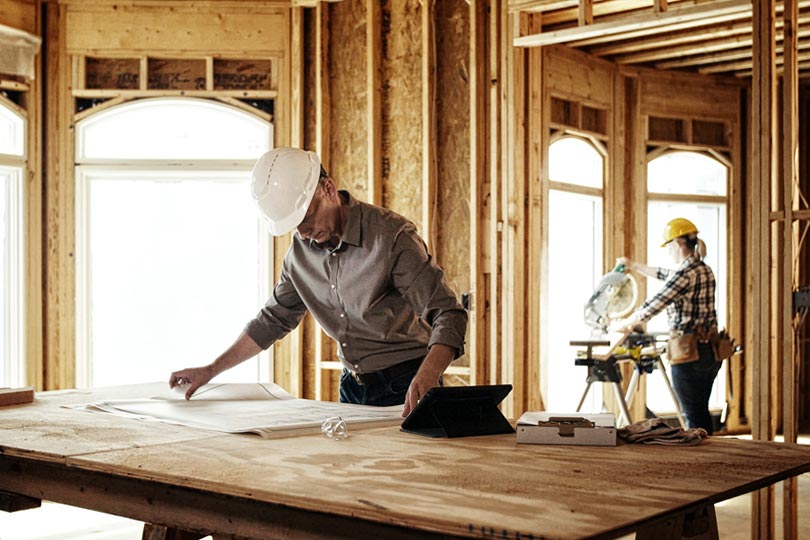Interest Rates Are Falling, Are You Ready For A Construction Loan?

The Fed stepped in to curb rising inflation by increasing interest rates; this indirectly affected the housing market (it costs more to loan money when the Fed ups the Federal Funds Rate as it did over the summer.)
Rising interest rates combined with rising home values (and prices) created the 2022 housing market’s conditions, but the Fed’s moves to curb inflation are beginning to work and one side effect of that is mortgage rates are beginning to fall.
Building A Home When Rates Are Falling
Is now the right time to explore your One-Time Close construction loan options? If you haven’t started budgeting and saving for a construction loan, rushing into one won’t help you get the best deal. But some are afflicted by something known in the cryptocurrency community as FOMO or “fear of missing out”.
Is FOMO a good idea to hurry into a construction loan? No, it’s not. But some aren’t reassured that simply being patient is a good idea--they want reasons why they should NOT rush in at a time when rates are finally beginning to look like they have peaked.
Reasons To Move Carefully In The Next Six Months Before Committing To A One-Time Close Loan
One of the most important reasons not to rush into building a house right now? Even when it looks like rates may be coming back down to earth? The level rates are falling to today are likely to be lower after the new year.
Market corrections sometimes come suddenly and dramatically, but in raising interest rates earlier in 2022 the Fed wanted a softer landing.
And that soft landing is, based on the advice of many financial experts, pundits, bloggers, and observers, likely to be more apparent in 2023.
Rates could fall back down to the five percent range or better depending on circumstances, but even if they do not fall back down to the record levels we saw in the years leading up to 2022, any major improvement will be welcome.
The takeaway from all of this at present? Apply for a new loan when you are READY to do so and not before. Rushing into a loan without having worked on your credit, and without having saved up a large enough down payment and it won’t matter what the interest rates are when you apply; not being ready can jeopardize loan approval even in the best of times.
Want More Information About One-Time Close Loans?
We have done extensive research on the FHA (Federal Housing Administration) and the VA (Department of Veterans Affairs) One-Time Close Construction loan programs.
We have spoken directly to licensed lenders that originate these residential loan types in most states and each company has supplied us with the guidelines for their products. We can connect you with mortgage loan officers who work for lenders that know the product well and have consistently provided quality service.
If you are interested in being contacted by a licensed lender in your area, please send responses to the questions below. All information is treated confidentially.
OneTimeClose.com provides information and connects consumers to qualified One-Time Close lenders to raise awareness about this loan product and to help consumers receive higher-quality service.
We are not paid for endorsing or recommending the lenders or loan originators and do not otherwise benefit from doing so. Consumers should shop for mortgage services and compare their options before agreeing to proceed.
Please note that investor guidelines for the FHA and VA One-Time Close Construction Program only allow for single-family dwellings (1 unit) – and NOT for multi-family units (no duplexes, triplexes or fourplexes).
In addition, the following homes/building styles are not allowed under these programs: Kit Homes, Barndominiums, Log Cabin Homes, Shipping Container Homes, Stilt Homes, Solar (only) or Wind Powered (only) Homes.
Contact Us: Send Us Your Request – Spam Safe
Please send your email request to [email protected] which authorizes OneTimeClose.com to share your personal information with one mortgage lender licensed in your area to contact you.
1. Send your first and last name, e-mail address, and contact telephone number.
2. Tell us the city and state of the proposed property.
3. Tell us your and/or the Co-borrower’s credit profile: Excellent – (680+), Good - (640-679), Fair – (620-639), or Poor- (Below 620). 620 is the minimum qualifying credit score for this product.
4. Are you or your spouse (Co-borrower) eligible veterans? If either of you is an eligible veteran, down payments as low as $0 may be available up to the maximum amount your debt-to-income ratio per VA will allow – there are no maximum loan amounts as per VA guidelines. Most lenders will go up to $1,500,000 and review higher loan amounts on a case-by-case basis. If not, the FHA down payment is 3.5% up to the maximum FHA lending limit for your county.
Do you know what's on your credit report?
Learn what your score means.

July 26, 2024The Federal Housing Administration (FHA) offers qualifying borrowers the option to build a home from the ground up using a Single Close FHA Construction Loan. This program, also known as a One-Time Close construction mortgage, allows borrowers to finance the construction of a new home and convert it into a permanent mortgage with just one closing, streamlining the often complex process of building a house.
July 19, 2024VA One-Time Close construction loans help qualifying veterans build homes they will own and occupy once the construction phase is complete. One-time close loans, or construction-to-permanent loans, combine construction and permanent financing into a single closing procedure. VA One-Time Close mortgages have no VA-required down payment or mortgage insurance, making them attractive options for qualifying borrowers.
July 12, 2024When planning a construction loan, you have many options. For example, do you want to buy land with a loan to build the house? Or do you already own a parcel suitable for the construction project? There are many other choices to make with home loans, but some don’t necessarily apply to construction mortgages.








